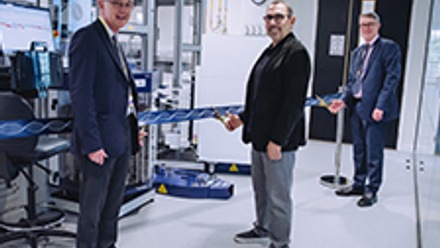The UK's genomics sector: Poised for continued growth and impact

Genomics has become an integral part of the UK's healthcare system, revolutionising patient care and driving innovation within both small and medium-sized enterprises (SMEs) and large pharmaceutical companies. Our new report, Genomics nation 2023: A genomics powered UK life science ecosystem, published today, by the BIA, in collaboration with the Wellcome Sanger Institute, and Medicines Discovery Catapult (MDC), highlights the profound impact of genomics on the UK's life sciences sector and public health system. In this blog, Saqib Lal, BIA’s Head of Content looks at the key findings.
The UK's genomics sector is poised for continued growth and impact, with the potential to revolutionise healthcare, combat climate change, and contribute to a sustainable future. Driven by a rich heritage of pioneering research, a thriving ecosystem of SMEs, and a steadfast commitment to collaboration, the UK is well-positioned to capitalise on the immense potential of genomics.
Steve Bates, CEO of the BIA, said: “The UK’s dynamic genomics industry is thriving and stands to benefit both patients and taxpayers as it continues to grow. We possess a vibrant ecosystem of spin-outs, scale-ups, and SMEs that are developing and scaling innovations poised to enhance health and wellbeing, not just in the UK but worldwide. I hope this report helps demonstrate not only their strengths but also the strength of the UK ecosystem in which they are thriving.”
A demonstration of the strength and depth of UK genomics is Flagship Pioneering, a prominent biotech incubator, recently launching Quotient Therapeutics, its first UK-based company. Quotient is focused on developing a genome sequencing platform that can identify and analyse intracellular mutations, which are genetic variations that occur within individual cells. These mutations can play a role in the development of various diseases, including cancer. Flagship Pioneering has invested $50 million in Quotient and has provided the company with office space in Cambridge, UK. This, as well as Flagship Pioneering's decision to establish a base in London, their first non-US office, is a vote of confidence in the UK’s life sciences sector. The UK government has committed to investing in the life sciences sector and has a number of initiatives in place to support the sector. Flagship Pioneering’s investment in the UK will create new jobs and opportunities for the UK’s life sciences sector.
In another milestone, the UK Biobank has released the genetic data of 500,000 people, making it the largest genetic dataset of its kind. This data has the potential to revolutionise healthcare. The release of this data is a major milestone in medical research and could lead to the development of new treatments and cures.
Here are some of the highlights and takeaways from the report:
A decade of innovation and impact
As Genomics England celebrates its 10th anniversary, it is important to recognise the remarkable progress that has been made in the UK's genomics sector over the past decade. The 100,000 Genomes Project, a landmark initiative that sequenced the genomes of 100,000 NHS patients, stands as a testament to the UK's leadership in precision medicine.
This project has generated a vast trove of genomic data, which is being used to develop new diagnostic tools, treatments, and personalised medicine approaches.
A thriving ecosystem of SMEs: Driving innovation at scale
The UK's genomics landscape is characterised by a vibrant community of SMEs, each contributing their unique expertise to advance the field. These SMEs are at the forefront of developing novel technologies, diagnostic tools, and therapeutic approaches, transforming the way we approach healthcare and disease prevention.
Collaboration: The cornerstone of success
At the heart of the UK's genomics success lies a deep-rooted culture of collaboration, fostered by strong partnerships between academia, industry, and government. This collaborative spirit has been instrumental in driving innovation, accelerating research, and translating scientific discoveries into tangible benefits for patients.
Data: The fuel for discovery
High-quality data is the lifeblood of genomics, providing the raw material for groundbreaking discoveries. The UK boasts a wealth of genomics data assets, including Genomics England, UK Biobank, and numerous disease-specific datasets. These resources provide a rich foundation for research and development, enabling scientists to identify genetic variants associated with disease, develop personalised treatment plans, and design novel therapies.
The UK's commitment to data sharing and collaboration has been instrumental in making this data accessible to researchers worldwide.
Artificial intelligence: Amplifying the power of genomics
Artificial intelligence (AI) is playing an increasingly pivotal role in the genomics landscape. AI algorithms can analyse vast amounts of data, identify patterns, and make predictions, significantly enhancing our understanding of biological processes and disease mechanisms. This power of AI is already evident in proteomics, where AI-driven tools are revolutionising our ability to study proteins, the workhorses of our cells.
Navigating the path forward: Nurturing innovation and collaboration
To fully realise the potential of the UK's genomics sector, we must continue to foster a collaborative environment that nurtures innovation and enables SMEs to scale up. This requires a multifaceted approach that includes:
- Enhanced data sharing and collaboration.
- Industry-academia partnerships.
- Talent development and skills training.
- Supportive regulatory environment.
Capitalising on growth opportunities
The UK's genomics sector is poised for continued growth, driven by a number of factors, including:
- The unlocking of pension funds through the Mansion House Compact: This will provide a new avenue for institutional investment to reach scaling companies, providing the financial resources needed to nurture their growth.
- Emerging technologies: AI, functional genomics, and other emerging technologies are opening up new avenues for innovation and discovery.
- The maturing industry: The UK's genomics sector is becoming increasingly mature, with a growing number of experienced companies and a strong pipeline of innovation.






